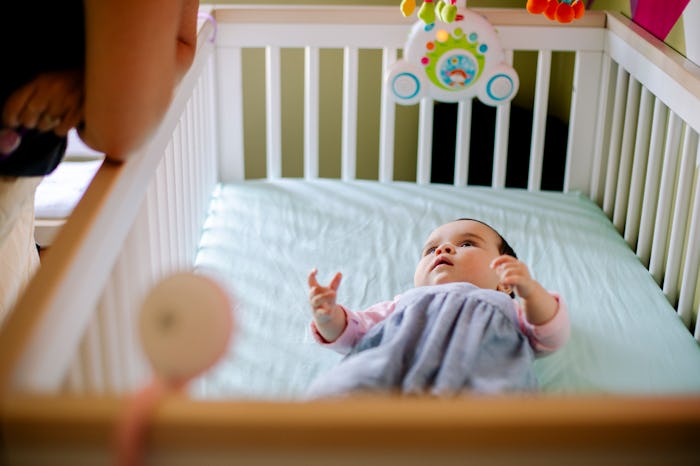Life

Singing To Your Baby *Does* Help Them Fall Asleep, & Experts Love These Lullabies
Ah, the soothing sounds of Beethoven before bedtime. Or maybe your newborn is more of the George Strait type? Whatever your family listens to at night, you might hope it sends baby into dreamland. But do babies sleep better with music? Yes, depending on what you play and when, the experts say.
Marial Biard, board-certified neurologic music therapist at Texas Children’s Hospital, tells Romper in an interview that there's evidence to support that music is helpful for sleep.
“The World Health Organization has acknowledged the significance of music for relaxation, sleep assistance, and development in babies’ brains for well over 10 years, and we have empirical evidence that supports this. Research has helped prove live sung lullabies can improve sleep patterns, and we’ve found it’s most beneficial in the space right between quiet alert wakefulness and entering that first stage of sleep,” she says.
So, that window of time when your baby is falling asleep? That’s the only time you want to play music in their room. If you keep it on after they’ve dozed off, their brains can get too used to the sound for it to be helpful anymore, she says. The best method is to leave it on for 20 minutes as your little one is trying to fall asleep, turning it off once they do, Biard says. Then, if they awaken in the middle of the night, turn the music back on for the same effect.
How does this compare with a white noise machine? There isn’t much research to confirm how helpful white noise is for sleep. Board-certified music therapist Nicole Camp of UAB Hospital and Children’s of Alabama explains to Romper that music is the more scientifically proven option.
“Music and its unique properties also mask household sounds, but music is pitched, unlike white noise, therefore making it easier for your baby’s brain to process,” Camp says.
And luckily, there's not necessarily any one genre of music to add to your baby's nightly routine, says Biard. If you're thinking a little Mozart will do, she says his music is actually meant to be exciting. Instead, focus on keeping it simple and enjoyable.
For example, Biard says, “Pearl Jam has an entire lullaby album, so parents can still find music they really love adapted into something beneficial for babies to sleep to." She also recommends exploring some of the many lullaby albums out there on Spotify. To keep the mood peaceful for sleeping, make sure your music decibel level is between 40 and 50 decibels, she says. "There are great apps you can download on your phone to help you determine that decibel level.”
If you or your partner want to warm up your vocal cords or dust off your musical instruments, even better. Abby Whitlock, board-certified music therapist at UAB Hospital, recommends parents sing lullabies to their babies to send them off to sleep but notes that pressing play on "uncomplicated lullabies with a slow, steady rhythm" will do the job, too.
Classic songs like “Mary Had a Little Lamb,” “Twinkle, Twinkle, Little Star,” and “The Wheels on the Bus” are excellent examples. “There’s a reason those old school lullabies are used so frequently,” Whitlock says. “They have falling thirds or fifths, and they mimic the sounds of us sighing. When we sigh, it triggers relaxation in our bodies.”
And as long as baby seems nice and relaxed, rock on — and hopefully, sleep well.
Experts:
Marial Biard, MM, MT-BC, board-certified neurologic music therapist at Texas Children’s Hospital
Nicole Camp, MT-BC, NICU-MT, board-certified music therapist at the University of Alabama at Birmingham Hospital and Children’s of Alabama
Abby Whitlock, MT-BC, NICU-MT, board-certified music therapist at the University of Alabama at Birmingham Hospital
This article was originally published on